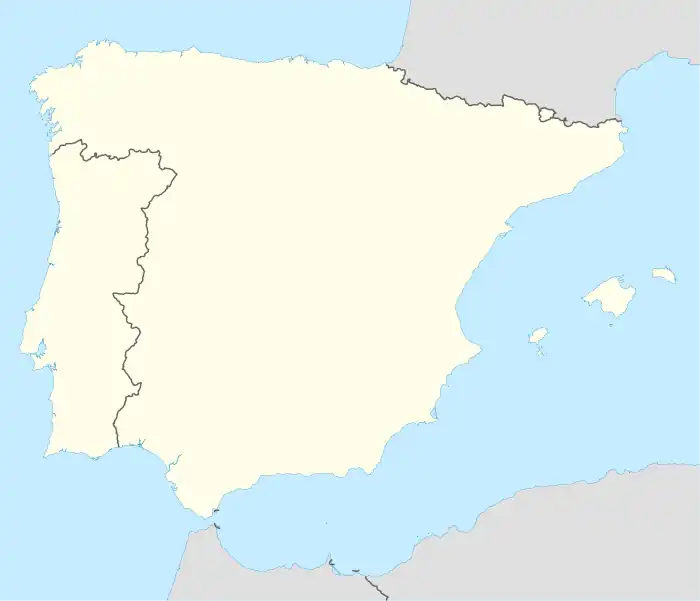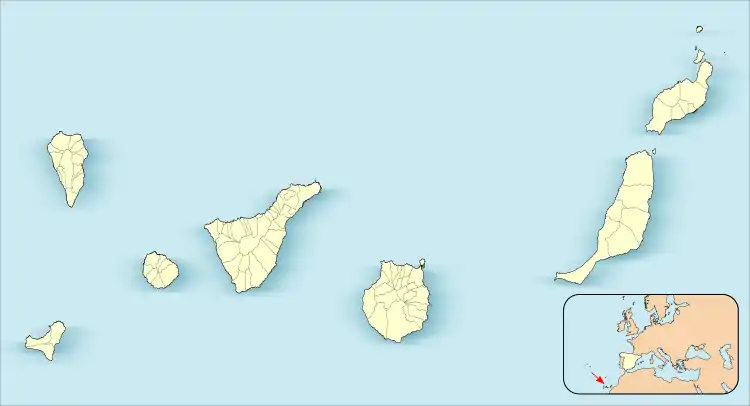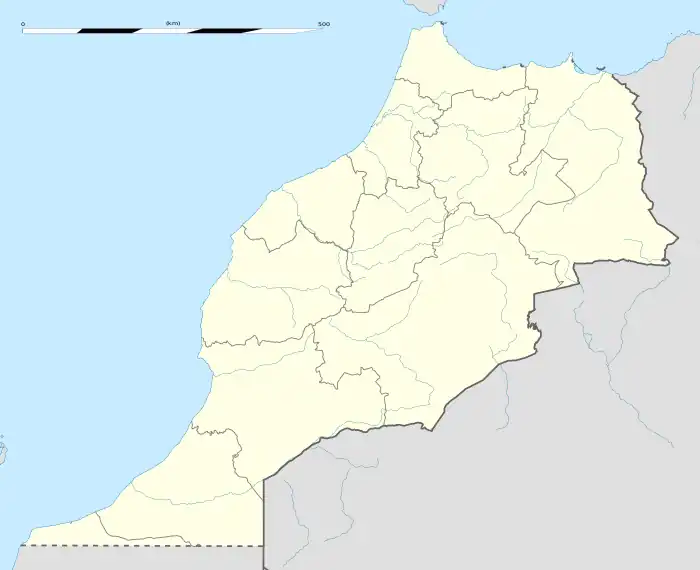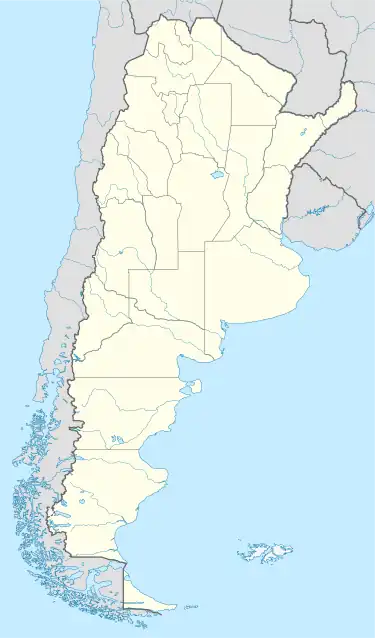| كأس العالم لكرة القدم 2030 Coupe du Monde FIFA 2030 Copa do Mundo FIFA de 2030 Copa Mundial de la FIFA 2030 ⴰⴽⵔⵡⴰⵙ ⵏ ⵓⵎⴰⴹⴰⵍ ⵏ ⵜⵡⵊⵊⴰ ⵏ ⵓⴹⴰⵕ 2030 | |
|---|---|
| Tournament details | |
| Host countries | Morocco Portugal Spain Anniversary match hosts: Argentina Paraguay Uruguay |
| Dates | 8 June – 21 July[1] |
| Teams | 48 (from 6 confederations) |
| Venue(s) | TBD |
The 2030 FIFA World Cup will be the 24th FIFA World Cup, a quadrennial international football tournament contested by the men's national teams of the member associations of FIFA. The 2030 World Cup will mark the centennial World Cup competition. For the first time, three countries from two continents will host the competition, with Morocco, Portugal and Spain as host nations. Additionally, Argentina, Paraguay and Uruguay will serve as nations that open the event, as a commemoration of the 100th anniversary of the first World Cup in Uruguay.[2] This will be the first World Cup held in Africa since 2010, in South America since 2014, as well as in Europe since 2018.
Host selection
FIFA launched the bidding process in earnest in 2022.[3][4] As hosts of the 2022 and 2026 editions respectively, the 2030 FIFA World Cup cannot be hosted by a member of the Asian AFC or the North American CONCACAF.[5][6]
Hosts are required to have at least fourteen all-seater stadiums with a capacity of 40,000, with a minimum of seven being pre-existing. The opening match and final must take place in an 80,000-seat stadium, while the semi-finals must take place in a 60,000-seat stadium.[7] Hosts must also have at least 72 suitable training site options for team base camps, four suitable venue-specific training site options per stadium, in addition to two suitable referee base camp training site options, all with suitable accommodation.[7] The FIFA Council also regulates requirements relating to broadcasting sites, competition-related event sites, as well as accommodation. In addition, sustainability, environmental protections and human rights will also be factors considered by the council, along with governmental support, the organisational model to be used, besides provisions for the establishment of a "legacy fund".[7][8]
Potential venues
- † denotes stadium used for previous men's World Cup tournament (Argentina, Spain and Uruguay only)
- ⋆ planned stadiums to be built
- + stadiums that will undergo renovation
| Camp Nou † + | Stage Front Stadium | Santiago Bernabéu † + | Metropolitano Stadium | Estádio da Luz | Estádio José Alvalade | |
| Capacity: 99,354
Expandable to: 105,000 |
Capacity: 40,000 | Capacity: 84,744 | Capacity: 70,460 | Capacity: 64,642 | Capacity: 50,095 | |
.jpg.webp) |
 |
 |
 |
 |
 | |
2030 FIFA World Cup (Canary Islands) |
||||||
| Nou Mestalla * | La Cartuja + | |||||
| Capacity: 70,000 | Capacity: 60,721
Expandable to: 75,000 | |||||
 |
 | |||||
| San Mamés | Estádio do Dragão | |||||
| Capacity: 53,289 | Capacity: 50,033 | |||||
 |
 | |||||
| Estadio Nueva Condomina + | El Molinón † + | |||||
| Capacity: 31,179
Expandable to: 42,000 |
Capacity: 29,029
To be expanded | |||||
 |
 | |||||
| La Rosaleda † + | La Romareda † + | Balaídos † + | Riazor † + | Estadio Gran Canaria + | Anoeta Stadium | |
| Capacity: 30,044
Expandable to: 45,000 |
Capacity: 33,608
Expandable to: 42,500 |
Capacity: 29,000
Expandable to: 41,900 |
Capacity: 32,660
Expandable to: 48,000 |
Capacity: 32,392
Expandable to: 44,682 |
Capacity: 40,000 | |
 |
 |
 |
 |
 | ||
| Grand Stade de Casablanca * | Prince Moulay Abdellah Stadium + | Ibn Batouta Stadium + | Adrar Stadium + | Marrakesh Stadium + | Fez Stadium + | |
| Capacity: 113,000 | Capacity: 53,000
Expandable to: 69,500 |
Capacity: 65,000
Expandable to: 88,000 |
Capacity: 45,480
Expandable to: 55,000 (at least) |
Capacity: 45,240
Expandable to: 70,000 |
Capacity: 45,000
Expandable to: 55,000 (at least) | |
 |
 |
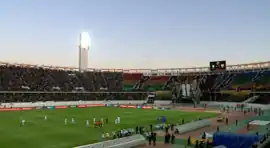 |
 |
 | ||
Centenary ceremony match host cities:
2030 FIFA World Cup (South America) | ||||
| Centenario † + | Antonio Vespucio Liberti † | Estadio CONMEBOL * | ||
| Capacity: 60,000 | Capacity: 83,000 | Capacity: 60,000 | ||
 |
.JPG.webp) | |||
Teams
Qualification
All six host nations will qualify for the World Cup.[2][9][10]
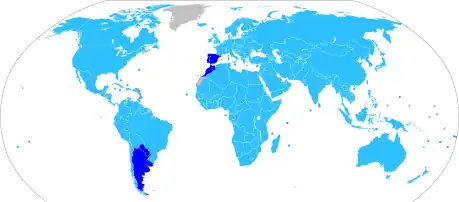
| Team | Method of qualification |
Date of qualification |
Total times qualified |
Last time qualified |
Current consecutive appearances |
Previous best performance |
|---|---|---|---|---|---|---|
| Co-hosts | 4 October 2023[11] | 7[upper-alpha 1] | 2022 | 2 | Fourth place (2022) | |
| 9[upper-alpha 2] | 2022 | 6 | Third place (1966) | |||
| 17[upper-alpha 3] | 2022 | 12 | Winners (2010) | |||
| Anniversary match co-hosts | 5 October 2023[11] | 19[upper-alpha 4] | 2022 | 13 | Winners (1978, 1986, 2022) | |
| 9[upper-alpha 5] | 2010 | 0 | Quarter-finals (2010) | |||
| 15[upper-alpha 6] | 2022 | 4 | Winners (1930, 1950) |
- ↑ Morocco may still qualify for the 2026 FIFA World Cup, which could bring their prior appearances to 8.
- ↑ Portugal may still qualify for the 2026 FIFA World Cup, which could bring their prior appearances to 10.
- ↑ Spain may still qualify for the 2026 FIFA World Cup, which could bring their prior appearances to 18.
- ↑ Argentina may still qualify for the 2026 FIFA World Cup, which could bring their prior appearances to 20.
- ↑ Paraguay may still qualify for the 2026 FIFA World Cup, which could bring their prior appearances to 10.
- ↑ Uruguay may still qualify for the 2026 FIFA World Cup, which could bring their prior appearances to 16.
Concerns
The 2030 FIFA World Cup has already been met with backlash from fans, football officials, and environmental groups with them noting the large distance between South America and Europe would require considerable plane travel, which would increase the carbon footprint and negate FIFA's carbon neutral plans. They have also noted the issues for fans of teams who would get drawn with Argentina, Paraguay, and Uruguay, as well as the short amount of rest once those teams travel back to the main hosts. Former FIFA president Sepp Blatter warned that the amount of hosts that the 2030 FIFA World Cup has would cause the tournament to "lose its identity". Others have noted that with the FIFA rotation system, CONCACAF (which hosted the 2026 FIFA World Cup), CONMEBOL, UEFA, and CAF would be unable to bid, leaving 2034 open to the AFC and OFC, which has led to accusations that FIFA selected the hosts in order to ensure that Saudi Arabia, an AFC member with major human rights controversies, would have their bid unopposed.[12]
References
- ↑ FIFA. "Bidding process 2030". FIFA. Retrieved 6 October 2023.
- 1 2 FIFA. "FIFA Council takes key decisions on FIFA World Cup editions in 2030 and 2034". FIFA. Retrieved 4 October 2023.
- ↑ "Agenda of meeting no. 11 of the FIFA Council" (PDF). FIFA. 21 October 2019. Archived (PDF) from the original on 29 October 2021. Retrieved 21 October 2019.
- ↑ "Who will host 2030 FIFA World Cup? Bids from Africa, South America, and Europe in the running, including Ukraine". The Sporting News. 5 October 2022. Archived from the original on 11 January 2023. Retrieved 14 November 2022.
- ↑ Tim Hill in New York (9 March 2017). "Trump travel ban could prevent United States hosting World Cup". The Guardian. Archived from the original on 14 November 2021. Retrieved 11 April 2017.
- ↑ Rumsby, Ben (14 October 2016). "England's hopes of hosting 2030 World Cup given boost". The Telegraph. Archived from the original on 12 January 2022. Retrieved 14 January 2017.
- 1 2 3 "FIFA World Cup 2030 – Overview of Hosting Requirements" (PDF). FIFA. Retrieved 24 June 2023.
- ↑ "FIFA Council appoints United States as host of new and expanded FIFA Club World Cup". FIFA.com. 23 June 2023.
- ↑ Fútbol, Asociación Paraguaya de. "Consejo de la FIFA confirma a Paraguay como sede inaugural del Mundial 2030". Asociación Paraguaya de Fútbol.
- ↑ "FIFA World Cup 2030: Everything you need to know". 10 October 2023. Retrieved 21 October 2023.
- 1 2 "Argentina, Paraguay, Uruguay Get Automatic Places For 2030 World Cup". 5 October 2023. Retrieved 7 October 2023.
- ↑ Klawans, Justin (6 October 2023). "FIFA catches blowback over 2030 World Cup". The Week.
